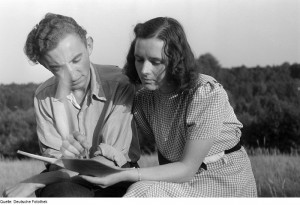“Expostulation and Reply” (1798)
William Wordsworth
“Why William, on that old grey stone,
Thus for the length of half a day,
Why William, sit you thus alone,
And dream your time away?
Where are your books? that light bequeath’d
To beings else forlorn and blind!
Up! Up! and drink the spirit breath’d
From dead men to their kind.
You look round on your mother earth,
As if she for no purpose bore you;
As if you were her first-born birth,
And none had lived before you!”
One morning thus, by Esthwaite lake,
When life was sweet I knew not why,
To me my good friend Matthew spake,
And thus I made reply.
“The eye it cannot chuse but see,
We cannot bid the ear be still;
Our bodies feel, where’er they be,
Against, or with our will.
Nor less I deem that there are powers,
Which of themselves our minds impress,
That we can feed this mind of ours,
In a wise passiveness.
Think you, mid all this mighty sum
Of things for ever speaking,
That nothing of itself will come,
But we must still be seeking?
— Then ask not wherefore, here, alone,
Conversing as I may,
I sit upon this old grey stone,
And dream my time away.”

William Wordsworth, an English Romantic poet, states in his poem, “Expostulation and Reply,” a story in which his friend Matthew asks him why he has chosen to attempt to gain knowledge and wisdom from sitting in nature with only his own mind instead of the traditional method of books and text. This is a question I find myself asking as well. As a younger version of myself I was a firm believer in finding insight through experiences. My body may have went to school and completed exams and read books, but my mind was looking for another, more hands-on way to discover what I found of importance in this world. The current version of myself still believes the truth in this idea, but in going to class and learning of other times and places I find myself gaining understanding through text.
I think there must be a balance. We must study concepts and history through reading and comprehending textbooks and other written work, but we must not forget to take what we learn and apply it to our experiences. I believe wisdom cannot be gained through just hearing the details of World War II, schizophrenia, or William Wordsworth and then sitting alone in one’s room. Wisdom comes from understanding what you learn and using it while experiencing the world around us.
Wordsworth has a point in stating that our minds and bodies have great powers, but if we don’t feed our powerful components with texts and experiences, how will they get the strength to feed us?
I’m interested in your thoughts, BU. What is the more important factor in gaining knowledge: texts or life experiences? Or, are these two elements doomed to be like peanut butter and jelly: one just doesn’t do the trick without the other right beside it?
